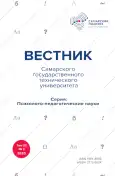Межкультурная перспектива: мнение российских студентов об индонезийском преподавателе английского языка на онлайн-занятиях
- Авторы: Прихатин Й.1
-
Учреждения:
- Университет Панкасакти Тегал
- Выпуск: Том 22, № 2 (2025)
- Страницы: 101-112
- Раздел: Педагогика высшей школы
- URL: https://bakhtiniada.ru/1991-8569/article/view/310344
- DOI: https://doi.org/10.17673/vsgtu-pps.2025.2.7
- ID: 310344
Цитировать
Полный текст
Аннотация
Глобализация образования и расширение онлайн-обучения усилили межкультурные контакты, особенно в обучении английскому языку. В данном исследовании изучается мнение российских студентов об индонезийских преподавателях английского языка на онлайн-занятиях для понимания, как культурные, лингвистические и педагогические аспекты взаимодействуют в виртуальных средах. Используя качественный метод исследования кейса, были собраны данные через форму онлайн-наблюдения и полуструктурированные интервью с российскими студентами университетов, обучающимися на онлайн-курсах английского языка, проводимых индонезийским преподавателем. Результаты показывают, что обучающиеся в значительной степени ценили коммуникативный и ориентированный на студента подход учителя, который отклонялся от их обычных ожиданий относительно взаимодействия в рамках занятия. Однако также были выявлены проблемы с языковой подготовкой, технологической адаптивностью и культурными заблуждениями. В обсуждении подчеркивается, что эффективное онлайн-обучение английскому языку в межкультурных условиях требует не только языковой компетентности, но и культурной осведомленности и адаптируемых методик преподавания. Использование образовательных технологий показало, что оно увеличивает вовлеченность и автономию, однако его успех зависит от способности преподавателя учитывать разные потребности студентов. Подчеркивается необходимость формирования межкультурной компетентности у преподавателей английского языка для создания инклюзивных и эффективных онлайн-учебных сред. Эти выводы имеют значение для подготовки преподавателей и разработки учебных программ в условиях международной образовательной среды.
Полный текст
Открыть статью на сайте журналаОб авторах
Йога Прихатин
Университет Панкасакти Тегал
Автор, ответственный за переписку.
Email: yogaprihatin@upstegal.ac.id
степень доктора философии, преподаватель факультета английского языка
Индонезия, ул. Дж. Халмахера, 1, Тегал, Центральная Ява, 52121Список литературы
- Pilat A., Warschauer M., Suparsa I.N. et al. New concept of teaching English to students from non-English speaking countries. European Scientific Journal. 2014. No. 10(14). Р. 2134. https://www.ijournalse.org/index.php/ESJ/article/download/2134/pdf (Accessed February 21, 2025).
- International TEFL Academy. My experience teaching English abroad in Indonesia and Russia. 2023. https://www.internationalteflacademy.com/blog/teaching-english-in-indonesia-and-russia (Accessed February 24, 2025).
- Frontiers in Education. Increasing the effectiveness of educational technologies in the foreign language learning process: Comparative analysis of Russian, Indonesian, and Egyptian students. Frontiers in Education. 2022. No. 7. Article 1011842. https://www.frontiersin.org/journals/education/articles/10.3389/feduc.2022.1011842/full (Accessed January 24, 2025).
- Andini T.N., Ye Eun L., Khramova A., Żok A. ELT Comparison: Increasing Students Speaking Ability in Indonesia, South Korea, Russia, and Poland. ELIF. 2022. No. 5(2). Рр. 1–13. https://jurnal.umj.ac.id/index.php/ELIF/article/download/6078/3932 (Accessed January 23, 2025).
- Altbach P.G., Knight J. The Internationalization of Higher Education: Motivations and Realities. Journal of Studies in International Education. 2007. No. 11(3-4). Рр. 290–305 (as cited in ITES, 2024). https://ites.istes.org/index.php/ites/article/download/1/2 (Accessed January 3, 2025).
- Noviyenti, Morganna, Fakhruddin. The Paradigms of Teaching English across Cultures: EFL Teachers’ Perspectives. International Journal of Curriculum and Instruction. 2020. No. 12(1). Рр. 1–16. https://files.eric.ed.gov/fulltext/EJ1249485.pdf (Accessed January 13, 2025).
- Kumi-Yeboah A. Designing a Cross-Cultural Collaborative Online Learning Framework for Online Instructors. Online Learning Journal. 2018. No. 22(4). Рр. 181–200. https://files.eric.ed.gov/fulltext/EJ1202361.pdf (Accessed January 13, 2025).
- Tabrizi E. et al. Exploring the components of online classroom observation. English Language Teaching. 2024. No. 18(4). Рр. 1–20.
- Aziz N., Memon S.A., Anjum S. Perception of students and teachers regarding online teaching of English language: A case of secondary school Hyderabad – Pakistan. Academy of Education and Social Sciences Review. 2023. No. 3(2). Рр. 163–171. https://doi.org/10.48112/aessr.v3i2.495 (Accessed February 13, 2025).
- Mohamed A.M., Nasim S., Aljanada R., Alfaisal A. Lived experience: Students’ perceptions of English language online learning post COVID-19. Journal of University Teaching & Learning Practice. 2023. No. 20(7). https://doi.org/10.53761/1.20.7.12 (Accessed February 13, 2025).
- Muslem A., Apriani Fata I., Nur L.M. Analyzing students’ perceptions of English language learning through online learning implementation. Jurnal Pendidikan Indonesia. 2022. No. 11(3). Рр. 437–447. https://doi.org/10.23887/jpiundiksha.v11i3.45764 (Accessed February 13, 2025).
- JETA. Cross culture understanding in EFL teaching: An analysis for Indonesia context. Journal of English Teaching and Applied Linguistics. 2020. https://www.academia.edu/73201425/Cross_Culture_Understanding_in_EFL_Teaching_An_Analysis_for_Indonesia_Context (Accessed February 19, 2025).
- Hasymi M., Nurkamto J. Cross-cultural experiences in teacher education: Indonesian pre-service English teachers’ perspectives on international teaching practicum. Veles. 2023. No. 7(3). Рр. 614–626. http://dx.doi.org/10.29408/veles.v7i3.24115 (Accessed February 16, 2025).
- Ajarn.com. (n.d.). The online English teacher. https://www.ajarn.com/ajarn-street/articles/the-online-english-teacher (Accessed February 17, 2025).
- Italki. Learn Indonesian with Riska – Your Indonesian tutor. 2023. https://www.italki.com/en/teacher/15130982 (Accessed February 10, 2025).
- Sulistiyo U. et al. Online observation protocol to supervise online learning and its implementation. Advances in Social Science, Education and Humanities Research. 2023. No. 601. Рр. 1–10.
- Robinson R.B., Benedict A.E., Papacek A.M., Koziarski G. A systematic review of online teaching methods in higher education. Journal of Higher Education Theory and Practice. 2024. No. 24(8). Рр. 1–20.
- Berman N.B. et al. The development of a reporting form for peer observation of online learning courses: An e-Delphi consensus study of educators working in health professions education. Medical Teacher. 2023. No. 45(11). Рр. 1–10.
- Creswell J.W., Poth C.N. Qualitative Inquiry and Research Design: Choosing Among Five Approaches (4th ed.). SAGE Publications. 2018.
- Yin R.K. Case Study Research and Applications: Design and Methods (6th ed.). SAGE Publications. 2018.
- Braun V., Clarke V. Using thematic analysis in psychology. Qualitative Research in Psychology. 2006. No. 3(2). Рр. 77–101. https://doi.org/10.1191/1478088706qp063oa (Accessed February 14, 2025).
- Palinkas L.A., Horwitz S.M., Green C.A., Wisdom J.P., Duan N., Hoagwood K. Purposeful sampling for qualitative data collection and analysis in mixed method implementation research. Administration and Policy in Mental Health and Mental Health Services Research. 2015. No. 42(5). Рр. 533–544. https://doi.org/10.1007/s10488-013-0528-y (Accessed February 13, 2025).
- RISE Programme Indonesia. Classroom observation tool for assessing the dimensions of teaching quality. 2020. https://rise.smeru.or.id/sites/default/files/publication/tr_cerdasrise_en.pdf (Accessed February 13, 2025).
Дополнительные файлы







